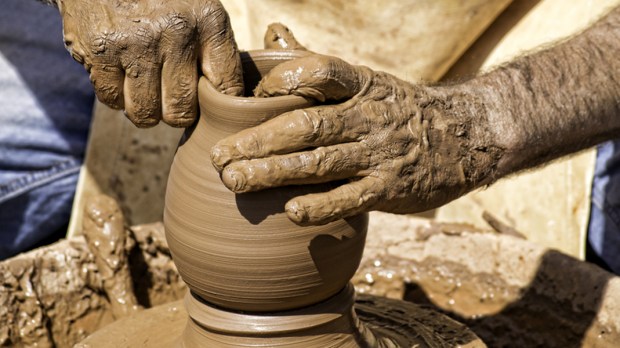Do you know those people who are always starting projects? Perhaps you yourself are one such person. Having read an article or seen a video about this or that craft or home improvement, you eagerly set out to buy supplies and undertake this new personal venture.
But how many times do the supplies sit there, the work remaining to begin? Or how many times does the project begin and then suddenly come to a halt, remaining incomplete? This is an all-too-familiar human experience. But this Sunday, the Second Sunday of Ordinary Time, God calls out to us, demonstrating that he completes everything he starts.
The work of God is not a haphazard thing. The Lord knew before the moment of our conception what he had in store for our lives. In one of my favorite lines of Scripture, the Lord assures the prophet Jeremiah, “For I know the plans I have for you, says the Lord, plans for welfare and not for evil, to give you a future and a hope” (Jer. 29:11). God is not figuring our lives out as the years go on. He is always directing us, leading us, providing for us, comforting us.
Frequently, though, in Christian life, accepting God’s providential care is a source of contention. We consider the things God puts before us too small to matter or too great to bear. We allow little vices to creep in, deeming them inconsequential, or abandon the work altogether, feeling crushed by challenges. We ask ourselves, is it really possible to live like He lived or love like He loved?
Commenting on the great call to love in God’s providential plan, St. Basil the Great told the monks of his monastery,
We have already received from God the ability to fulfill all his commands. We have then no reason to resent them, as if something beyond our capacity were being asked of us. We have no reason either to be angry, as if we had to pay back more than we had received.
It is the Lord’s work. He has given to us all that we need to follow him.
God’s plan is not simply that we would survive this side of eternity. God has created us in such a way and–more marvelously still–redeemed us, so that we might manifest his greatness and power. “You are my servant,” he tells us, “through whom I show my glory” (Isa. 49:3). St. Irenaeus, in a much quoted phrase, declares, Gloria Dei est vivens homo: “The glory of God is man fully alive!”
What does it mean to be fully alive? What does it mean to truly be a living man? To be alive we must be human. Not in the sense that we carry “acceptable” vices and seem comfortable, but rather we must put on Christ. The Second Vatican Council reminds us, “The truth is that only in the mystery of the incarnate Word does the mystery of man take on light” (Gaudium et Spes, 22). Only in Christ can the mystery of our life be revealed. Christ is the perfect man. Like us in all things but sin, He shows us the way.

Read more:
The Assumption helps us understand what we are as humans, suggests Pope Francis
This is the cry of John the Baptist, “Behold the Lamb of God!” We who believe in the work Christ does can hear John saying, “Behold the one who makes it possible to be man!” or “Behold the one who reveals the mystery of life!”
Christ who comes to us, just as he sought out John the Baptist, arrives in our lives to burst open the limits and constraints that we put on our hearts. As St. Paul reminds the Christians at Corinth: we have been sanctified in Christ, we are called to be holy! (1 Cor 1:2). We are not simply playing this game of life to make it through. God is here to transform us. He is in our midst offering something new.
C.S. Lewis offers one of the best literary examples of thinking of what Christ does for us in his children’s book The Lion, the Witch, and the Wardrobe. Aslan, the lion and Lord of Naria, is a Christ figure. Before meeting Aslan, Lucy, an English child who has ventured into the world of Narnia, asks, “Is he safe?” Mr. Beaver, explaining Aslan the lion to Lucy, says, “Safe? Who said anything about safe? ‘Course he isn’t safe. But he’s good. He’s the King, I tell you.”
So often in our lives we would prefer a Christ who is safe. We might be tempted to worship a Christ of our own making. We fall in love with our own ideas of the Lord and decide that Jesus is comfortable with this or that indulgence. “He doesn’t mind that I don’t regularly confess,” we tell ourselves. “He knows that it wasn’t a big deal that I missed Mass,” we say. “The poor are not really my problem,” we secretly contend. “I’m just here to check my box. See you next week,” is the way of life some choose.
This is not Christ. This is not glory. This thinking is not Christian. This is not the fullness of life that God has in store for us.
Jesus is good. He wants for us so much more. He invites us to be made holy.
At this and every Holy Mass, the priest will raise the Sacred Host and repeat the words of John the Baptist: “Behold the Lamb of God. Behold Him who takes away the sins of the world.” What can he take from your life? Ask Jesus, truly present in the Eucharist, how He wants to make you holy.
These are not fruitless questions; remember, the Lord always finishes what He has begun!

Read more:
A former White House speechwriter discovers a secret to holiness

